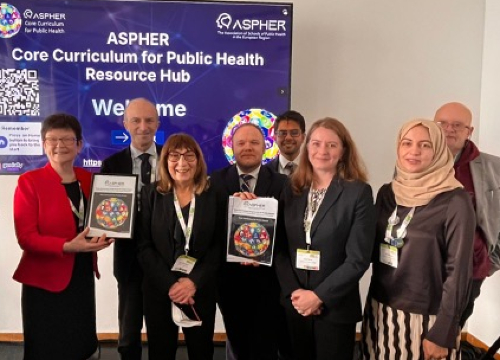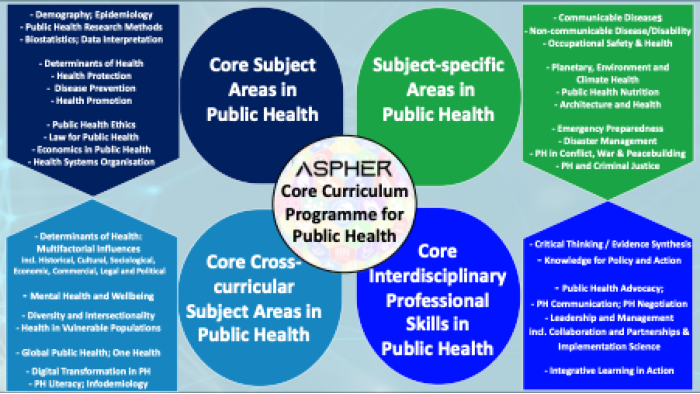 On Health Science Week (8-14 March), UCD School of Public Health, Physiotherapy and Sports Science (PHPSS) celebrated the Association of Schools of Public Health in the European Region (ASPHER) first Core Curriculum for Public Health. Led by Professor Mary Codd from UCD PHPSS and UCD ASPHER Fellow Karl F. Conyard, the programme was launched at the 17th European Public Health Conference in Lisbon, Portugal, last November and is now being implemented across the ASPHER Network in many of the 130 ASPHER-member Schools of Public Health across the WHO European Region.
On Health Science Week (8-14 March), UCD School of Public Health, Physiotherapy and Sports Science (PHPSS) celebrated the Association of Schools of Public Health in the European Region (ASPHER) first Core Curriculum for Public Health. Led by Professor Mary Codd from UCD PHPSS and UCD ASPHER Fellow Karl F. Conyard, the programme was launched at the 17th European Public Health Conference in Lisbon, Portugal, last November and is now being implemented across the ASPHER Network in many of the 130 ASPHER-member Schools of Public Health across the WHO European Region.
Speaking this week, Professor Codd said: “With increasing world complexity, public health is being reshaped by factors such as: climate change, environmental degradation and natural disasters; humanitarian and public health crises in war-torn regions; food and water insecurity; new and emerging infectious diseases; and rapid developments in digital technology, all of which contribute to a constantly changing landscape for public health. This ‘new normal’ calls for the re-defining of competencies in public health and renewed attention to public health education and training.”
In developing the ASPHER Core Curriculum for Public Health, an extensive scoping and consultative process resulted in 35 subject areas collated into four domains: core subject areas (essential in all programmes of public health); subject-specific areas (largely determined by contemporary challenges); core cross-curricular subject areas (applicable across programmes integrated with core and subject-specific areas); and core interdisciplinary professional skills, those desirable skills of Public Health Professionals.
The updated curriculum addresses critical current topics including: planetary health and climate change; public health law and ethics; emergency preparedness and disaster management; War and Conflict and peace building; public health and the built environment; health equity, diversity, and intersectionality; and digital transformation in society and healthcare.
New and improved programmes see students learning about modern approaches such as One Health and Global Health, as well as significant current issues and trends including the impact of digital transformation and AI in public health, social marketing, commercial determinants and health inequalities.
Professor Codd said: “The overall objective of this Core Curriculum for Public Health is to reflect where and how education and training in public health can be improved to maintain currency with emerging public health issue, and to best equip current and future public health professionals to contribute maximally to their communities and societies, nationally and internationally. Importantly, it emphasises the interdisciplinarity of public health and the pivotal role of public health professionals in effecting change for the improvement and protection of the public health.”
Prof Kevin Fenton CBE PrFPH, President of the UK Faculty of Public Health and Public Health Director for London said: “Great to see…the updating of the ASPHER Core Curriculum for Public Health to reflect new challenges and opportunities for public health, ensuring [public health] training remains fit for purpose. [I am] excited about the expanded competency areas which are comprehensive yet relevant”
Former ASPHER president Professor Carlo Signorelli, University Vita-Salute San Raffaele, Milano, said: “[The ASPHER Core Curriculum] marks a significant evolution in how we prepare public health professionals for the challenges of the 21st century. This updated curriculum shifts the focus from competencies to curricula, addressing critical contemporary topics to the traditional ones.”
Professor Hazem Agha, Dean of the Faculty of Public Health, Al-Quds University, Palestine, and ASPHER Core Curriculum expert advisory group member, said: "Over the past two years, some 130 Schools and Institutes of Public Health and more than 350 public health professionals from academia, practice and training, have collaborated to make this happen. We trust that this curriculum will help to ensure that the education of current and future public health professionals is aligned with real-world developments and challenges in our discipline.”
Pictured above: (L-R) Prof Mary Codd; Prof Carlo Signorelli; Prof Alison McCallum, University of Edinburgh; Mr Karl F Conyard; Dr. Jwenish Kumawat, UCD; Prof Judit Simon, Medical University of Vienna; Dr Samia Latif, Faculty of Public Health, UK; Prof John Middleton, Vice-President, Global Network for Academic Public Health (GNAPH).
More about developing the ASPHER Core Curriculum
In a modified Delphi-like approach, a study of ASPHER-member Schools and Institutes of Public Health, to ascertain public health programme content and delivery, was carried out. Responses were received from 60 Schools with >500 notifications of areas of expertise relevant to public health. Collated by subject area into curricular concept maps from which themes within subject areas were derived, curricular elements were identified.
Consultation on the proposed content through workshops and follow up surveys specifically addressed (a) levels of agreement to inclusion of the elements identified; and (b) the educational levels (bachelor, master, doctoral, vocational training, continuing professional development) at which the content should be delivered. Expert Advisory Groups constituted from public health experts, academics, young professionals and current students of public health at master and doctoral levels contributed to consensus on content and delivery.

For each subject area an indicative list of curricular elements, combined into thematic areas, is provided along with the interconnectedness of each subject area with all other subject areas of a comprehensive public health education curriculum.
Applications of the Core Curriculum include self-evaluation of programme curricular content, programme development and/or modifications within the constraints of time and resources available, collaboration across Schools and programmes on the sharing of expertise and content to fill gaps, development of online modules, micro-credentials and toolkits to facilitate the sharing and delivery of material, and the basis for programme accreditation.